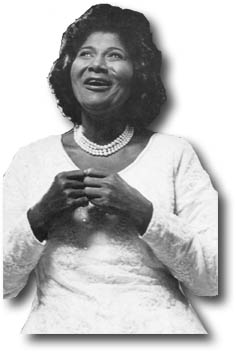
Mahalia Jackson had more to do with defining what is today called “Gospel” music than any singer before or after. Once branded a young rebel by conservative black churchgoers she is now universally revered as the greatest Gospel singer of all time.
Mahalia Jackson was born on October 26, 1911 in the music soaked city of New Orleans, Louisiana. One of six children, she was born in a modest house on Water Street, overlooking the Mississippi in New Orleans. By the time she was five, Mahalia was singing every Sunday in her father's church choir. Her father, Johnny Jackson Jr., was a dockworker by day, a barber by night, and the preacher at Plymouth Rock Baptist Church every weekend.
At the tender age of 16 she moved, like so many other southern African Americans, to the big city promise of Chicago. There she worked as a maid and laundress. “I'd be scrubbin' the floor, and I'd turn on a Bessie Smith record to make the work go faster." Bessie Smith's recording of "Careless Love" was her favorite. "The Mother of the Blues" became Mahalia's strongest influence even though Mahalia would never perform Jazz or Blues. She explained, "The Blues are fine for listenin'. But I never would sing them. I was saved.” She was the featured singer at the South Side Greater Baptist Church. She became incredibly popular in Illinois, and neighboring states, as she made guest appearances at Baptist churches all over the Midwest.
By 1937 she began a 14 year association with the father of Gospel music, Thomas A. Dorsey. That same year, in a huge Chicago building called The Furniture Mart, she recorded 4 songs for Decca Records. “God’s Gonna Separate The Wheat From The Tares”, “Oh My Lord”, “God Shall Wipe All Tears Away”, and “Keep Me Every Day”. The last two recordings are historically noteworthy in that they marked the introduction of organ to Gospel music.
In 1946 she got a break and signed with Apollo Records. Her first recordings did moderately well, spurred on by an appearance on Studs Terkel’s radio show. But real success came on her last session with Apollo when she recorded her “Move On Up A Little Higher”. Recorded in September of 1947, it was not released until the following year. But when it was finally released, it caused the greatest explosion in Gospel of all time. Record stores could not secure enough copies to fill the demand. The record sold well over a million copies, unprecedented in Gospel. She was declared the official soloist of the National Baptist Convention. In 1954 she was hired by CBS to star in a weekly show and became the first person to broadcast nationwide the pure “sanctified” style of Gospel.
Eventually Mahalia spread her brand of Gospel across four continents. When she sang "Silent Night" on Denmark's national radio, 20,000 requests for copies streamed in. She appeared four times at Carnegie Hall. She sang for four American presidents, Truman, Eisenhower, Kennedy, and Johnson.
By the 1960’s she had expanded her horizons beyond Gospel music. She was a leader in the field of Black education, and a businesswoman with her own chain of soul food restaurants. She also began using her music in support of the civil rights movement. A key supporter of Dr. Martin Luther King Jr., she sang Thomas A. Dorsey’s “Take My Hand, Precious Lord” at Kings funeral.
As fate would have it, Aretha Franklin sang the very same song at Mahalia’s funeral after her death on January 27th, 1972.
P.W. Fenton
